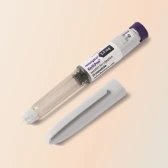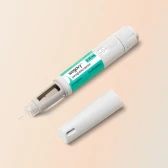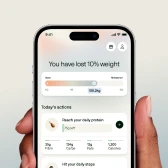Whether you're vegan, vegetarian, or simply reducing animal products for health reasons, allergies, or intolerances, keeping your meals balanced is key, especially if you're taking GLP-1 medications like Wegovy or Mounjaro.
Here are three simple tips that will help you thrive on a plant-based diet without missing out on the nutrients your body needs to feel its best.
1. Build a balanced plate
Let’s start with a refresh. A balanced plate typically includes:
- ½ vegetables
- ¼ protein
- ¼ complex carbohydrates
- A thumb-sized portion of fat
As you increase your dose of weight loss medication, you may find that your hunger reduces and you end up eating smaller portions than before. Choosing nutrient-rich foods helps make every bite count.
Protein is key
For plant-based eaters, protein can be the trickiest part, but you have plenty of options, such as lentils, tofu, tempeh, chickpeas, beans, quinoa, nuts, seeds, and dairy or eggs (if you eat them).
Some foods, like beans or chickpeas, count as both a protein and a carbohydrate. But if they’re your only protein source, add another carb such as brown rice or sweet potato. Bonus: swap in quinoa for extra protein.
Snack ideas: Opt for protein-rich snacks. Think nut butter on fruit, trail mix, edamame beans, yogurt, or eggs (if you eat them). Protein helps preserve muscle mass, which is super important while taking weight loss medication.
Voy’s protein pairing rule
Combine these for optimal absorption:
- Legumes (lentils, chickpeas) + grains (brown rice, quinoa)
- Tofu/Tempeh + nuts/seeds
Snack hack: Keep roasted edamame in your bag: 1 handful = 12g protein!

2. Focus on key nutrients
Reducing animal products means paying attention to certain nutrients, especially when your overall food intake may be lower.
Iron
Plant-based iron (called “non-haeme iron”) isn’t absorbed as easily as iron in animal products. So, pair iron-rich plant-based foods like dark leafy greens, lentils and wholegrains with vitamin C sources (such as peppers, strawberries, oranges) to boost absorption.
Avoid tea, coffee and red wine around meals, as they can block iron absorption.
Vitamin B12
If you’re not including dairy products in your diet, you’ll need to get vitamin B12 through fortified foods, such as plant-based milks or nutritional yeast, or opt for a supplement.
Calcium
If you don’t eat dairy, include calcium sources such as plant milk with added calcium, calcium-set tofu, almonds, sesame seeds, and leafy greens like kale.
Omega-3
Omega-3 is mainly found in oily fish. Plant sources include flaxseeds, chia seeds, and walnuts, though the body doesn’t convert them efficiently into active forms (EPA and DHA). So you might want to consider an algae-based supplement.
Unsure about your nutrient levels or starting a new supplement while on weight loss medication? It’s best to check with your GP first.
3. Read labels carefully
This is especially important for allergy sufferers. Allergen ingredients are usually in bold, but always double-check. For those avoiding animal products, look for trusted vegan or vegetarian certifications.
Coach's Note
If you have food allergies, do this quick 3-step check every time:
- Look for bold words – UK law highlights allergens like nuts or milk in bold
- Check ‘may contain’ warnings – usually in small print near ingredients
- Save safe foods – snap photos of labels you’ve vetted or keep a note on your phone
– Bethany Tripp | Coach at Voy

It’s all about small steps
There’s no “perfect” way to eat, but with a few small changes, plant-based or allergy-friendly diets can be easy, balanced, and enjoyable. Our expert coaches are here to guide you with personalised advice, so you can eat well, and feel confident throughout your weight loss journey.
Written by
Registered Associate Nutritionist (ANutr) with experience in virtual health coaching, weight management, and psychology.





















